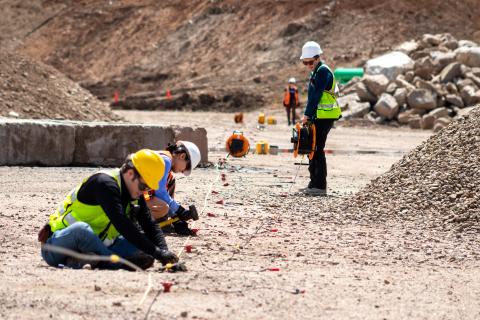All Categories
Featured
Table of Contents
Why Study Geophysics? in Sinagra Australia 2022

Other possible geophysicist majors that aren't geophysics or geoscience include: Atmospheric sciences and meteorology Chemical and physical oceanography Earth science Environmental science Hydrology and water resources science Materials science By making any geophysicist degree, and by taking the essential geology courses, you ought to certify for an entry-level position as a geoscientist or geophysicist.
Eventually, students should find out: a branch of geology that takes a look at the various elements of minerals, consisting of chemical structure, internal crystal structure, and physical residential or commercial properties. the research study of rocks and the processes and conditions that form and change them in time. There are a couple of neighborhoods in this branch of geology, including igneous, metamorphic, and sedimentary rocks.

This field takes a look at structural rock functions such as cleavage, faults, joints, and small folds. They must also learn the computer system skills needed to: analyze data develop digital models and maps run geoscientists' software Trainees must also take advantage of all chances to get real-world experience. Ambitious geophysicists must anticipate to hang out knowing: in the class in the field in labs Certainly, skills taught in the class are very important for striving geophysicists.
Geophysicist Salary And Job Description 2023 in Canning Vale Australia 2020
For example, geoscientists invest a lot of their time outside when operating in the field, so they must possess "outdoor skills" like camping and running boats, airplane, and other vehicles. Because they spend a lot time in remote locations, it's essential that geophysicists also have the physical stamina to bring necessary equipment on their walkings to locations of study.
The job provides: a high typical and top earnings a high rate of individual complete satisfaction amongst geophysicists low work tension favorable task outlook Additional information on revenues potential and task outlook is detailed below. For trainees looking to land an entry-level function as a geoscientist or geophysicist, it takes four years, or the time required to complete a bachelor's degree in geophysics or an associated discipline.
Some research study positions in geophysics need doctoral degrees. If you plan to teach at a college or university, you must earn a Ph. D. in geophysics or a related field. The time it takes to earn a Ph. D. varies by institution and program, however it typically takes four to six years beyond the bachelor's degree.
Geophysical Surveys As Landscape Archaeology in Alexander Heights Oz 2022
Many employers need candidates to have a bachelor's degree in geophysics or a closely related discipline for all entry-level positions. As an outcome, there's no method around the degree requirements for ending up being a geophysicist.
Presently, 31 states need licensing for geologists, although licensing is not constantly needed, specifically for entry-level work. The states that do concern licenses utilize the Basics of Geology Exam (FGE), which is administered through the National Association of State Boards of Geology (ASBOG). Now that you understand which degree for geophysicist jobs you need, you'll require to land a task, and it is very important to find out just how much money you can make in this profession.
According to BLS, the average yearly wage for geoscientists is $93,580. The lowest 10% of earners earn less than $52,000, while the highest 10% earn more than $201,000 yearly. Incomes vary by industry type and geographic place. According to BLS, particular industries offer higher incomes for geoscientists, and in many cases, they offer higher-than-average revenues.
What Does A Geophysicist Do? in Rivervale Australia 2021
In truth, mining, quarrying, and oil and gas extraction provides over $32,000 more every year than the average yearly wage for this occupation. The federal government, too, offers over $10,000 more in incomes than the nationwide average for geoscientists. In addition to industry type, geographical area can considerably impact earnings for this occupation.

The top-paying states and their annual mean salaries, according to the BLS, include: Texas $166,720 Oklahoma $149,630 Pennsylvania $120,590 Hawaii $120,130 Colorado $107,260 These 5 top-paying states use much greater salaries than the average for this occupation. In fact, incomes for geoscientists in Texas are over $73,000 higher than the nationwide average.
It ought to come as not a surprise that many of these high-paying areas remain in Texas and Oklahoma, however some are found in California, Louisiana, and Colorado. The top 10 highest-paying city areas for geoscientists are: Houston-The Woodlands-Sugar Land, Texas: $188,400 Tulsa, Oklahoma: $186,490 Midland, Texas: $167,040 Odessa, Texas: $147,080 Oklahoma City, Oklahoma: $145,350 Bakersfield, California: $130,080 Urban Honolulu, Hawaii: $124,470 New Orleans-Metairie, Louisiana: $121,030 Washington-Arlington-Alexandria, DC, VA, MD, WV: $120,180 Denver-Aurora-Lakewood, Colorado: $116,910 For some geoscientists and geophysicists, residing in a metro city is not as appealing as residing in a smaller community.
Latest Posts
How To Become A Geophysicist in Dalkeith WA 2022
What Is The Best Degree Path For Becoming A Geophysicist? in Floreat WA 2023
Marine Geology And Geophysics in Rivervale Western Australia 2022